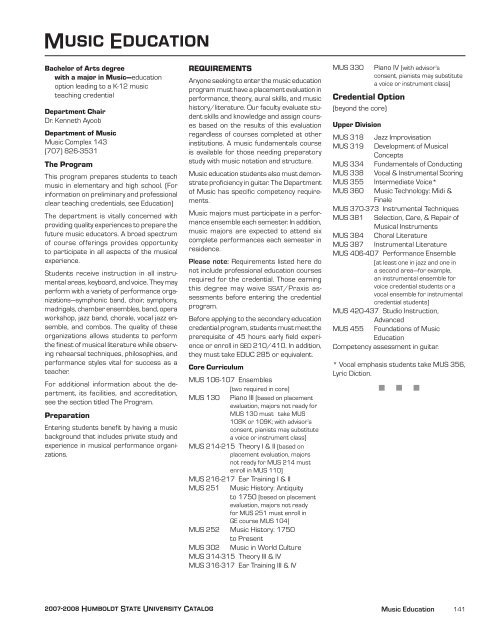2007-08 Academic Year - Humboldt State University
2007-08 Academic Year - Humboldt State University
2007-08 Academic Year - Humboldt State University
You also want an ePaper? Increase the reach of your titles
YUMPU automatically turns print PDFs into web optimized ePapers that Google loves.
Music Education<br />
Bachelor of Arts degree<br />
with a major in Music—education<br />
option leading to a K-12 music<br />
teaching credential<br />
Department Chair<br />
Dr. Kenneth Ayoob<br />
Department of Music<br />
Music Complex 143<br />
(707) 826-3531<br />
The Program<br />
This program prepares students to teach<br />
music in elementary and high school. (For<br />
information on preliminary and professional<br />
clear teaching credentials, see Education)<br />
The department is vitally concerned with<br />
providing quality experiences to prepare the<br />
future music educators. A broad spectrum<br />
of course offerings provides opportunity<br />
to participate in all aspects of the musical<br />
experience.<br />
Students receive instruction in all instrumental<br />
areas, keyboard, and voice. They may<br />
perform with a variety of performance organizations—symphonic<br />
band, choir, symphony,<br />
madrigals, chamber ensembles, band, opera<br />
workshop, jazz band, chorale, vocal jazz ensemble,<br />
and combos. The quality of these<br />
organizations allows students to perform<br />
the finest of musical literature while observing<br />
rehearsal techniques, philosophies, and<br />
performance styles vital for success as a<br />
teacher.<br />
For additional information about the department,<br />
its facilities, and accreditation,<br />
see the section titled The Program.<br />
Preparation<br />
Entering students benefit by having a music<br />
background that includes private study and<br />
experience in musical performance organizations.<br />
REQUIREMENTS<br />
Anyone seeking to enter the music education<br />
program must have a placement evaluation in<br />
performance, theory, aural skills, and music<br />
history/literature. Our faculty evaluate student<br />
skills and knowledge and assign courses<br />
based on the results of this evaluation<br />
regardless of courses completed at other<br />
institutions. A music fundamentals course<br />
is available for those needing preparatory<br />
study with music notation and structure.<br />
Music education students also must demonstrate<br />
proficiency in guitar. The Department<br />
of Music has specific competency requirements.<br />
Music majors must participate in a performance<br />
ensemble each semester. In addition,<br />
music majors are expected to attend six<br />
complete performances each semester in<br />
residence.<br />
Please note: Requirements listed here do<br />
not include professional education courses<br />
required for the credential. Those earning<br />
this degree may waive SSAT/Praxis assessments<br />
before entering the credential<br />
program.<br />
Before applying to the secondary education<br />
credential program, students must meet the<br />
prerequisite of 45 hours early field experience<br />
or enroll in SED 210/410. In addition,<br />
they must take EDUC 285 or equivalent.<br />
Core Curriculum<br />
MUS 106-107 Ensembles<br />
[two required in core]<br />
MUS 130 Piano III [based on placement<br />
evaluation, majors not ready for<br />
MUS 130 must take MUS<br />
1<strong>08</strong>K or 109K; with advisor’s<br />
consent, pianists may substitute<br />
a voice or instrument class]<br />
MUS 214-215 Theory I & II [based on<br />
placement evaluation, majors<br />
not ready for MUS 214 must<br />
enroll in MUS 110]<br />
MUS 216-217 Ear Training I & II<br />
MUS 251<br />
Music History: Antiquity<br />
to 1750 [based on placement<br />
evaluation, majors not ready<br />
for MUS 251 must enroll in<br />
GE course MUS 104]<br />
MUS 252 Music History: 1750<br />
to Present<br />
MUS 302 Music in World Culture<br />
MUS 314-315 Theory III & IV<br />
MUS 316-317 Ear Training III & IV<br />
MUS 330 Piano IV [with advisor’s<br />
consent, pianists may substitute<br />
a voice or instrument class]<br />
Credential Option<br />
(beyond the core)<br />
Upper Division<br />
MUS 318 Jazz Improvisation<br />
MUS 319 Development of Musical<br />
Concepts<br />
MUS 334 Fundamentals of Conducting<br />
MUS 338 Vocal & Instrumental Scoring<br />
MUS 355 Intermediate Voice*<br />
MUS 360 Music Technology: Midi &<br />
Finale<br />
MUS 370-373 Instrumental Techniques<br />
MUS 381 Selection, Care, & Repair of<br />
Musical Instruments<br />
MUS 384 Choral Literature<br />
MUS 387 Instrumental Literature<br />
MUS 406-407 Performance Ensemble<br />
[at least one in jazz and one in<br />
a second area—for example,<br />
an instrumental ensemble for<br />
voice credential students or a<br />
vocal ensemble for instrumental<br />
credential students]<br />
MUS 420-437 Studio Instruction,<br />
Advanced<br />
MUS 455 Foundations of Music<br />
Education<br />
Competency assessment in guitar.<br />
* Vocal emphasis students take MUS 356,<br />
Lyric Diction.<br />
• • •<br />
<strong>2007</strong>-20<strong>08</strong> <strong>Humboldt</strong> <strong>State</strong> <strong>University</strong> Catalog Music Education<br />
141
















